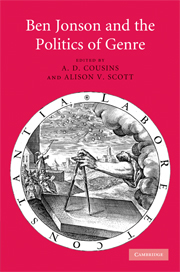Book contents
- Frontmatter
- Contents
- Notes on contributors
- Acknowledgements
- Introduction
- Chapter 1 Feigning the commonwealth: Jonson's Epigrams
- Chapter 2 The Jonsonian masque and the politics of decorum
- Chapter 3 The politics (and pairing) of Jonson's country house poems
- Chapter 4 Style, versatility, and the politics of the epistles
- Chapter 5 Jonson's politics of gender and genre: Mary Wroth and ‘Charis’
- Chapter 6 Jonson's metempsychosis revisited: patronage and religious controversy
- Chapter 7 Jonson's humanist tragedies
- Chapter 8 A generic prompt in Jonson's Timber, or Discoveries
- Bibliography
- Index
Chapter 4 - Style, versatility, and the politics of the epistles
Published online by Cambridge University Press: 30 June 2009
- Frontmatter
- Contents
- Notes on contributors
- Acknowledgements
- Introduction
- Chapter 1 Feigning the commonwealth: Jonson's Epigrams
- Chapter 2 The Jonsonian masque and the politics of decorum
- Chapter 3 The politics (and pairing) of Jonson's country house poems
- Chapter 4 Style, versatility, and the politics of the epistles
- Chapter 5 Jonson's politics of gender and genre: Mary Wroth and ‘Charis’
- Chapter 6 Jonson's metempsychosis revisited: patronage and religious controversy
- Chapter 7 Jonson's humanist tragedies
- Chapter 8 A generic prompt in Jonson's Timber, or Discoveries
- Bibliography
- Index
Summary
It has become usual to see Ben Jonson as a poet caught in a contradiction. On the one hand he is eager to pursue his own ideals and create a world of classical serenity beyond the grubby and corrupting reach of contemporary forces; on the other hand, he appears to be a shrewd exploiter of patronage, a market man who knows how to pander to the whims and prejudices of those in a position to help him materially. A modified version of the latter perspective insists that Jonson operated in a world of treachery and jeopardy, and that as a man of letters necessarily subjugated to the authority of others, he needed to watch his step. If he seems at points sycophantic, then he can hardly be blamed for practising manoeuvres designed to ensure his safety. In this chapter on the epistolary verses I shall pursue some of these alternative views of Jonson and try to decide whether or how they may be reconciled.
In his epistle to a fellow author, the jurist John Selden, Jonson makes a virtue of apology:
I have too oft preferred
Men past their terms, and praised some names too much;
But 'twas with purpose to have made them such.
No reader would deny the plausibility of this appeal. There is a moral art to flattery, and that is to procure a general social benefit by stimulating the need to appear good in a person of power or authority.
- Type
- Chapter
- Information
- Ben Jonson and the Politics of Genre , pp. 91 - 114Publisher: Cambridge University PressPrint publication year: 2009
- 1
- Cited by



